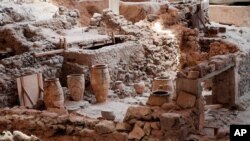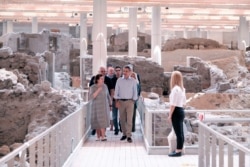The Greek island of Mykonos’ newest bar-restaurant, Pelican, seemed to appear from nowhere.
Tables, light fixtures and staff members with matching black face masks were still being slotted into place as Greeks visiting the island for a long holiday weekend trickled in to check out the place. The owner expects a slow summer but said he’s in a hurry to get back to business.
Greece is, too.
Heavily reliant on tourism, the country is officially reopening to foreigners on Monday after closing its borders to most during the coronavirus pandemic. Its hopes are pinned on popular tourist destinations such as Mykonos and the islands of Rhodes, Corfu, Crete and Santorini, where regular ferry service already resumed and direct international flights are set to restart on July 1.
The Greek government has taken a gamble in deciding to relax coronavirus health inspections at ports and airports in order to avoid another crippling recession, having only recently emerged from an economically painful period sparked by the international financial crisis.
Pelican’s owner, Vasilis Theodorou, has a view of the situation that is more steadfast than starry-eyed. Mykonos would normally be packed in early June, but its beaches were empty. Tourism might be down by as much as 80 percent this year, “so we’re waiting for the 20 percent, and we’re happy,” Theodorou said.
“No matter how much we wish for it and want it, it won’t be more than that,” he said. “We expect that tourists from central Europe will come first, and hopefully Americans at a later stage. They are our best customers.”
Prime Minister Kyriakos Mitsotakis acknowledged Saturday that Greece is prepared for a huge drop from the 33 million visitors who came to Greece last year. Addressing foreign journalists Saturday during a visit to Santorini, Mitsotakis went on a full sales pitch, touting everything from local products to the possibilities of year-round tourism in Greece.
“We don’t know the real impact of (a truncated tourist season) on GDP,” he said, “A lot will depend on whether people feel comfortable to travel and whether we can project Greece as a safe destination.”
Timely and strictly enforced lockdown measures have so far kept the infection rate in Greece low and the death toll below 200. But reopening means islands — many with only basic health facilities and previously sheltered from the outbreak on the Greek mainland — will again be receiving visitors from around the world far in excess of the local population.
Mykonos Mayor Konstantinos Koukas told the AP that islanders feel prepared and have clear government guidelines.
“We want to open back up and we are heading into the 2020 season with optimism,” he said. “But we are fully aware that ... (it) will be nothing like the season in 2019 — and hopefully nothing like the season in 2021.”
An island that to many epitomizes the high life and hedonism, Mykonos at this time of year would normally have high-paying customers spilling out of the bars and competing with cruise ship passengers for restaurant tables. VIP watchers have spotted pop star Katy Perry, soccer great Cristiano Ronaldo and other celebrities in recent summers.
This year, rented cars fill fenced-off lots, and most stores remain padlocked. Stray cats and the island’s mascot, a large, light pink pelican, roam the streets for company.
Mosaic artist Irene Syrianou has kept her workshop open despite the lack of customers. “We watch the news and hope for the best,” she says, cracking pieces of marble into chips with a hammer.
“Nearly all my customers are American, whether it’s buying pieces of art, making orders online, or attending classes I give during the summer,” she said, before adding with a chuckle: “So it’s going to be a tough year. But I’m an artist and I’ve gone hungry before.”
The government’s reopening policy has been criticized by the left-wing Syriza party, which argued tougher controls should be kept in place and arrivals limited to those recently tested in their countries of origin.
Health Minister Vassilis Kikilias insisted Friday that a safety net had been built for the islands — with connections to each other and to mainland hospitals for testing and health evacuations. Doctors and support staff will be deployed with the help of more than 100 mobile units in cars and speed boats. The Health Ministry will also have 11 futuristic-looking “transit capsules” for patients heading to intensive care facilities.
Greece’s gamble follows a decade of tourism growth and increasing reliance on the industry, with annual visitor numbers more than doubling since 2010 to 34 million last year and revenue up 80 percent to some 18 billion euros ($20.2 billion).
During many of those years, the country teetered on the brink of bankruptcy and exit from the euro currency bloc, while Greeks endured harsh economic austerity in return for three international bailouts.
Tourism Minister Harry Theoharis, once Greece’s top official for tax and revenues, said Friday that the country is determined to support its tourism industry.
“We’re sending a clear message to the world’s traveling public that we won’t take a step back, either in health safeguards or in opening up the country.”
And as the prime minister noted Saturday, there’s always next year.
“Hopefully in 2021, we’ll have a vaccine; 2021 will be a bumper year,” Mitsotakis said.





